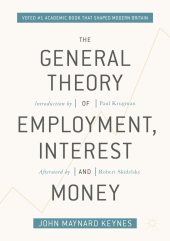 Neuerscheinungen 2018Stand: 2020-02-01 |
Schnellsuche
ISBN/Stichwort/Autor
|
Herderstraße 10
10625 Berlin
Tel.: 030 315 714 16
Fax 030 315 714 14
info@buchspektrum.de |

John Maynard Keynes
The General Theory of Employment, Interest, and Money
1st ed. 2018. 2018. xliii, 404 S. 210 mm
Verlag/Jahr: SPRINGER, BERLIN; SPRINGER INTERNATIONAL PUBLISHING 2018
ISBN: 3-319-70343-9 (3319703439)
Neue ISBN: 978-3-319-70343-5 (9783319703435)
Preis und Lieferzeit: Bitte klicken
This book was originally published by Macmillan in 1936. It was voted the top Academic Book that Shaped Modern Britain by Academic Book Week (UK) in 2017, and in 2011 was placed on Time Magazine´s top 100 non-fiction books written in English since 1923. Reissued with a fresh Introduction by the Nobel-prize winner Paul Krugman and a new Afterword by Keynes´ biographer Robert Skidelsky, this important work is made available to a new generation.
The General Theory of Employment, Interest and Money transformed economics and changed the face of modern macroeconomics. Keynes´ argument is based on the idea that the level of employment is not determined by the price of labour, but by the spending of money. It gave way to an entirely new approach where employment, inflation and the market economy are concerned.
Highly provocative at its time of publication, this book and Keynes´ theories continue to remain the subject of much support and praise, criticism and debate. Economists at any stage in their career will enjoy revisiting this treatise and observing the relevance of Keynes´ work in today´s contemporary climate.
Preface by John Maynard Keynes
Preface to the German Edition
Preface to the Japanese Edition
Preface to the French Edition
Introduction by Paul Krugman
Book I Introduction
1 The General Theory
2 The Postulates of the Classical Eco
3 The Principle of Effective Demand
Book II Definitions and Ideas
4 The Choice of Units
5 Expectation as Determining Output and Employment.
6 The Definition of Income, Saving and Investment.
7 The Meaning of Saving and Investment Further Considered
Book III The Propensity to Consume
8 The Propensity to Consume: I. The Objective Factors
9 The Propensity to Consume: II. The Subjective Factors
10 The Marginal Propensity to Consume and the Multiplier
Book IV The Inducement to Invest
11 The Marginal Efficiency of Capital
12 The State of Long-Term Expectation
13 The General Theory of the Rate of Interest
14 The Classical Theory of the Rate of Interest
15 The Psychological and Business Incentives to Liquidity
16 Sundry Observations on the Nature of Capital
17 The Essential Properties of Interest and Money
18 The General Theory of Employment Re-Stated
Book V Money-wages and Prices
19 Changes in Money-wages
20 The Employment Function
21 The Theory of Prices.- Book VI Short Notes Suggested by the General Theory
22 Notes on the Trade Cycle
23 Notes on Mercantilism, The Usury Laws, Stamped Money and Theories Of Under-Consumption
24 Concluding Notes on the Social Philosophy Towards which the General Theory Might Lead
Afterword by Robert Skidelsky
John Maynard Keynes (1883-1946) is one of the most influential economists of modern times. Educated at Cambridge University, he returned to teach at, and become a fellow of, Kings College, Cambridge. In 1915 Keynes joined the UK Treasury and acted as an advisor to government for many years. His ideas are now known the world over as Keynesian economics.


